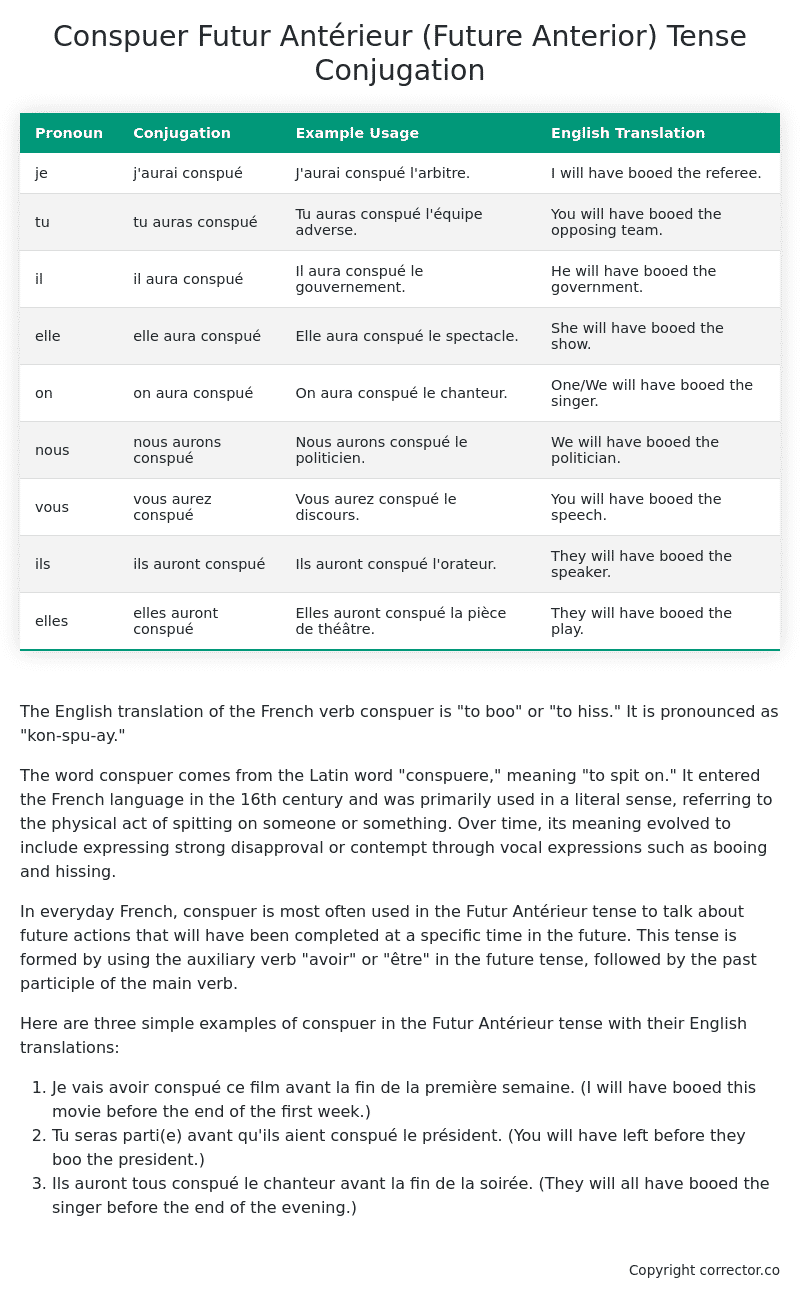Futur Antérieur (Future Anterior) Tense Conjugation of the French Verb conspuer
Introduction to the verb conspuer
The English translation of the French verb conspuer is “to boo” or “to hiss.” It is pronounced as “kon-spu-ay.”
The word conspuer comes from the Latin word “conspuere,” meaning “to spit on.” It entered the French language in the 16th century and was primarily used in a literal sense, referring to the physical act of spitting on someone or something. Over time, its meaning evolved to include expressing strong disapproval or contempt through vocal expressions such as booing and hissing.
In everyday French, conspuer is most often used in the Futur Antérieur tense to talk about future actions that will have been completed at a specific time in the future. This tense is formed by using the auxiliary verb “avoir” or “être” in the future tense, followed by the past participle of the main verb.
Here are three simple examples of conspuer in the Futur Antérieur tense with their English translations:
- Je vais avoir conspué ce film avant la fin de la première semaine. (I will have booed this movie before the end of the first week.)
- Tu seras parti(e) avant qu’ils aient conspué le président. (You will have left before they boo the president.)
- Ils auront tous conspué le chanteur avant la fin de la soirée. (They will all have booed the singer before the end of the evening.)
Table of the Futur Antérieur (Future Anterior) Tense Conjugation of conspuer
| Pronoun | Conjugation | Example Usage | English Translation |
|---|---|---|---|
| je | j’aurai conspué | J’aurai conspué l’arbitre. | I will have booed the referee. |
| tu | tu auras conspué | Tu auras conspué l’équipe adverse. | You will have booed the opposing team. |
| il | il aura conspué | Il aura conspué le gouvernement. | He will have booed the government. |
| elle | elle aura conspué | Elle aura conspué le spectacle. | She will have booed the show. |
| on | on aura conspué | On aura conspué le chanteur. | One/We will have booed the singer. |
| nous | nous aurons conspué | Nous aurons conspué le politicien. | We will have booed the politician. |
| vous | vous aurez conspué | Vous aurez conspué le discours. | You will have booed the speech. |
| ils | ils auront conspué | Ils auront conspué l’orateur. | They will have booed the speaker. |
| elles | elles auront conspué | Elles auront conspué la pièce de théâtre. | They will have booed the play. |
Other Conjugations for Conspuer.
Le Present (Present Tense) Conjugation of the French Verb conspuer
Imparfait (Imperfect) Tense Conjugation of the French Verb conspuer
Passé Simple (Simple Past) Tense Conjugation of the French Verb conspuer
Passé Composé (Present Perfect) Tense Conjugation of the French Verb conspuer
Futur Simple (Simple Future) Tense Conjugation of the French Verb conspuer
Futur Proche (Near Future) Tense Conjugation of the French Verb conspuer
Plus-que-parfait (Pluperfect) Tense Conjugation of the French Verb conspuer
Passé Antérieur (Past Anterior) Tense Conjugation of the French Verb conspuer
Futur Antérieur (Future Anterior) Tense Conjugation of the French Verb conspuer (this article)
Subjonctif Présent (Subjunctive Present) Tense Conjugation of the French Verb conspuer
Subjonctif Passé (Subjunctive Past) Tense Conjugation of the French Verb conspuer
Subjonctif Imparfait (Subjunctive Imperfect) Tense Conjugation of the French Verb conspuer
Subjonctif Plus-que-parfait (Subjunctive Pluperfect) Tense Conjugation of the French Verb conspuer
Conditionnel Présent (Conditional Present) Tense Conjugation of the French Verb conspuer
Conditionnel Passé (Conditional Past) Tense Conjugation of the French Verb conspuer
L’impératif Présent (Imperative Present) Tense Conjugation of the French Verb conspuer
L’infinitif Présent (Infinitive Present) Tense Conjugation of the French Verb conspuer
Struggling with French verbs or the language in general? Why not use our free French Grammar Checker – no registration required!
Get a FREE Download Study Sheet of this Conjugation 🔥
Simply right click the image below, click “save image” and get your free reference for the conspuer Futur Antérieur tense conjugation!

Conspuer – About the French Futur Antérieur (Future Anterior) Tense
Construction
Common Everyday Usage Patterns
Interactions with Other Tenses
For example
Summary
I hope you enjoyed this article on the verb conspuer. Still in a learning mood? Check out another TOTALLY random French verb conjugation!


